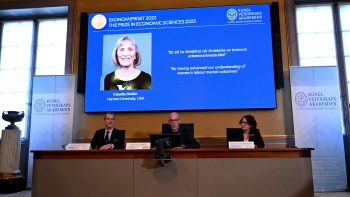Nobel prize-winner Alvin Roth: ‘Certainly didn’t see it coming’
Nobel prize-winner Alvin Roth: ‘Certainly didn’t see it coming’
This year’s Nobel Memorial Prize in Economics goes to Americans Alvin Roth and Lloyd Shapley. Roth is now at Stanford – and was at Harvard when he did his prize-winning work. Shapley is a professor emeritus at UCLA. The Nobel committee honored the two economists today for their work in “the theory of stable allocations and the practice of market design.”
Sounds obscure, but it actually turns out to be pretty practical. Marketplace Morning Report host Jeff Horwich spoke this morning with winner Alvin Roth.
Jeff Horwich: Congratulations, first of all — did you see this coming?
Alvin Roth: Thank you, I certainly didn’t see it coming in the near term. It was unexpected, but not unimaginable.
Horwich: Give me, if you could, sort of your elevator speech on what you were honored for here – market design. What is that?
Roth: Well, market design is trying to understand how marketplaces work well enough so that we can fix them when they are broken. My colleagues and I particularly study “matching markets”, which are the kinds of markets in which you can’t just choose what you want, but you also have to be chosen.
So, like getting into college, college admissions. Colleges can’t choose who come, they have to compete with other colleges. Students can’t choose where to go, they have to be admitted – they have to apply, and be admitted, and recruited.
And getting a job – you can’t just decide you want to work for Google, you have to be hired. And, they can’t just decide who they want to employ, they have to compete with Facebook and Stanford University. So, lots of the most important markets that we are involved in in our lives are these two-sided markets where you can’t just choose what you want but also have to be chosen.
 Nobel Prize in Economics History Tip: The official name of the award is The Sveriges Riksbank Prize in Economic Sciences in Memory of Alfred Nobel. It has been awarded 44 times to 71 Laureates between 1969 and 2012.Can you name the past winners of the Nobel Prize for Economics? Read more
Nobel Prize in Economics History Tip: The official name of the award is The Sveriges Riksbank Prize in Economic Sciences in Memory of Alfred Nobel. It has been awarded 44 times to 71 Laureates between 1969 and 2012.Can you name the past winners of the Nobel Prize for Economics? Read more
Horwich: From speaking with many economists, I know that many of them fret over the application of what they’re working on in the real world. Have you been relatively satisfied that you’ve been able to make a difference in real things?
Roth: Well, I’m glad we can make a difference. It’s hard to be satisfied when there’s still so much to be done. But yes, it’s very gratifying to help design marketplaces that get implemented and that help people go about their lives.
Horwich: Is there any particular example that you are most proud of in that respect?
Roth: Well, my colleagues and I have helped design labor-market clearing houses and we’ve helped design school choice systems and we’ve helped design kidney exchange. I guess those three are the big areas that my work has been applied to in recent years.
Horwich: The Nobel Committee honors people that have not just done interesting things but have fundamentally changed the field. Have you felt all along that you were fundamentally changing the field?
Roth: You know, you feel all along that you are struggling to make changes in the field and it’s nice that someone thinks that we have succeeded.
Horwich: All right, Professor Alvin Roth who along with Lloyd Shapley at UCLA won this year’s Nobel Memorial Prize in Economics. Thanks very much.
Roth: Thank you.
There’s a lot happening in the world. Through it all, Marketplace is here for you.
You rely on Marketplace to break down the world’s events and tell you how it affects you in a fact-based, approachable way. We rely on your financial support to keep making that possible.
Your donation today powers the independent journalism that you rely on. For just $5/month, you can help sustain Marketplace so we can keep reporting on the things that matter to you.


















